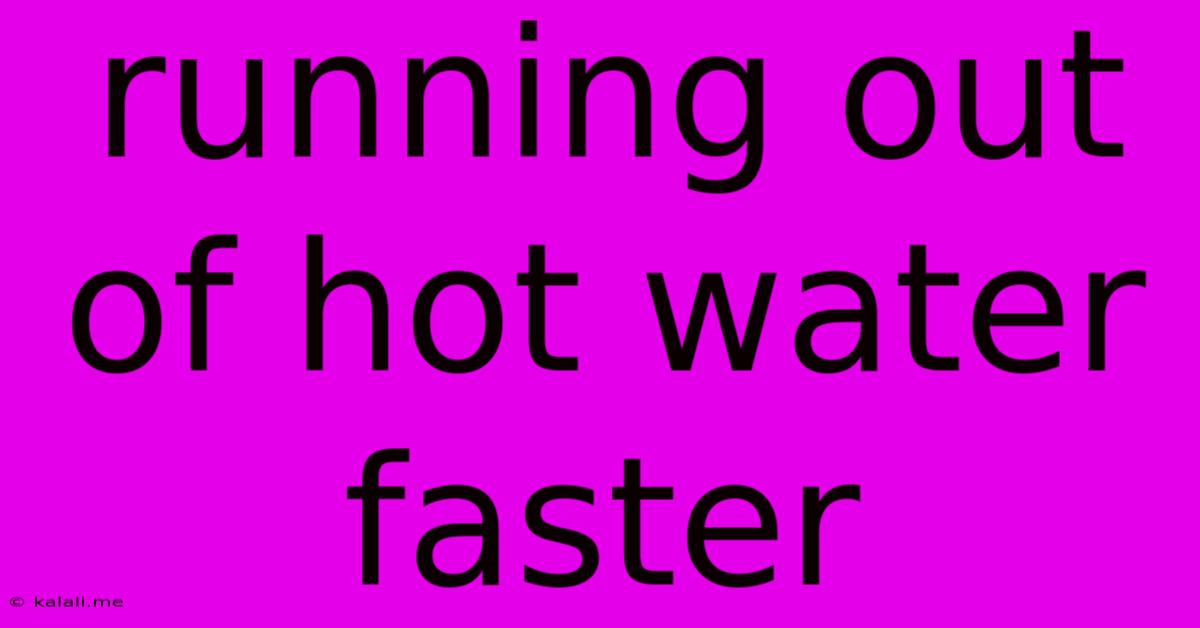Running Out Of Hot Water Faster
Kalali
Jun 08, 2025 · 3 min read

Table of Contents
Running Out of Hot Water Too Fast? Here's Why and How to Fix It!
Are you constantly battling lukewarm showers and frustrated by your hot water heater's seemingly dwindling supply? Running out of hot water prematurely is a common household problem, but it's often fixable. This article explores the most frequent culprits and provides practical solutions to help you enjoy long, hot showers again. We'll cover everything from simple adjustments to potential repairs, empowering you to diagnose and resolve the issue efficiently.
Common Reasons for Premature Hot Water Depletion
Several factors can contribute to your hot water disappearing faster than expected. Let's delve into the most common causes:
-
Low Water Heater Capacity: This is perhaps the most straightforward explanation. If your hot water heater is too small for your household's needs – perhaps due to an increase in family size or more frequent water usage – you'll inevitably run out faster. Consider the number of people in your home and their daily water consumption habits. A larger family or those who enjoy long showers will require a larger tank.
-
Faulty Thermostat: A malfunctioning thermostat may not accurately regulate the water temperature, leading to less hot water overall. It might not be heating the water sufficiently or turning off prematurely. A simple thermostat replacement could be a quick and inexpensive fix.
-
Sediment Buildup: Over time, mineral deposits accumulate at the bottom of your water heater tank. This sediment acts as insulation, reducing the tank's efficiency and decreasing the amount of hot water produced. Regular flushing can remove this sediment and restore optimal performance.
-
Leaky Faucets and Fixtures: Dripping faucets and leaky showerheads might seem insignificant, but they contribute to significant water wastage over time. These seemingly small leaks constantly drain your hot water supply, leaving you with less hot water overall.
-
Inefficient Showerheads and Fixtures: Older showerheads and faucets are often less water-efficient than newer models. Switching to low-flow showerheads and faucets can conserve a surprising amount of hot water, extending your supply considerably. Look for WaterSense labeled products for guaranteed efficiency.
-
Multiple Appliances Using Hot Water Simultaneously: Running the dishwasher, washing machine, and taking a shower all at once puts a significant strain on your hot water heater. Try to stagger these activities to avoid overwhelming the system.
-
Incorrect Water Heater Setting: If your water heater is set to a lower temperature than necessary, it may not provide sufficient hot water for your needs. Increase the temperature gradually, ensuring it remains within safe operating parameters.
Solutions and Troubleshooting Steps
Now that we've identified the potential problems, let's explore how to address them:
-
Check Your Water Heater's Size: If your family has grown or your water usage has increased, it might be time to consider upgrading to a larger water heater.
-
Inspect and Replace the Thermostat: If you suspect a faulty thermostat, try replacing it. This is often a relatively simple DIY project, but if you're unsure, consult a professional plumber.
-
Flush Your Water Heater Regularly: This crucial maintenance step removes sediment buildup and improves efficiency. Look up instructions specific to your water heater model. Annual flushing is recommended.
-
Fix Leaky Faucets and Fixtures: Repair or replace any dripping faucets and showerheads promptly. This is a simple yet highly effective method for conserving hot water.
-
Upgrade to Low-Flow Fixtures: Replace old, inefficient showerheads and faucets with WaterSense certified models.
-
Improve Hot Water Usage Habits: Try to stagger appliance usage and take shorter showers.
By addressing these potential issues, you can significantly extend your hot water supply, avoiding the frustration of lukewarm showers and dwindling hot water reserves. Remember, regular maintenance is key to maximizing your water heater's lifespan and efficiency. If you are unsure about any repair work, always consult a qualified plumber.
Latest Posts
Latest Posts
-
Why Do Cats Meow At The Door
Jun 08, 2025
-
What Does It Mean When A Dog Licks His Lips
Jun 08, 2025
-
How To Hang A Picture On A Brick Wall
Jun 08, 2025
-
How To Drop A Pin With Android
Jun 08, 2025
-
Can You Bring Shampoo In Checked Luggage
Jun 08, 2025
Related Post
Thank you for visiting our website which covers about Running Out Of Hot Water Faster . We hope the information provided has been useful to you. Feel free to contact us if you have any questions or need further assistance. See you next time and don't miss to bookmark.